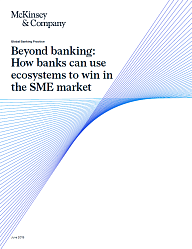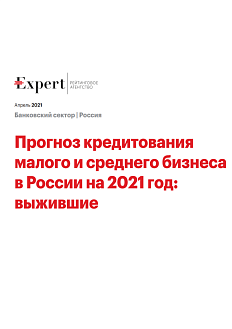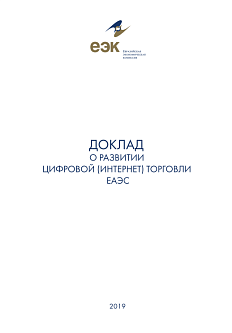SMEs and banking
In the publication, McKinsey & Company experts study how small and medium-sized enterprises (SMEs) interact with other market participants, banks in particular, and how banks can maximize returns using an innovative ecosystem proposition that addresses the needs of SMEs.
Since SMEs form the backbone of many economies around the world, it is particularly important for banks to reach SMEs. Representing one-fifth of global banking revenues, SMEs generate around $850 billion of annual revenue for banks—a pool expected to grow by approximately 7 percent annually over the next seven years.
The authors of the publication identify a range of factors that are making the SME sector increasingly attractive for banks. First, customers—including business owners—are becoming used to convenient and tailored services in their personal lives. Next, more cost-efficient models for serving SMEs are emerging, and helping to lift margins. Digitization makes processing cheaper and the growth of APIs are making it easier to serve SMEs.
Effectiveness of ecosystems
McKinsey & Company surveyed 500 small-business owners in North America to understand their day-to-day operations and challenges. The results of the survey suggest that entrepreneurs’ daily tasks fall into two categories. One is, obviously, building the core business: finding and approaching prospective clients, managing the delivery of products and services, and maintaining client relationships to generate further business. These activities are the true drivers of growth and profits. The other category includes administrative activities such as accounting and bookkeeping, payroll management, following up on payables and receivables, financing, tax planning, and managing payments and bank accounts. These are all essential tasks without which a company cannot function properly but they do not create profits.
The results of the survey indicate that business owners would prefer to concentrate on their core tasks. Thus, the authors conclude, an ecosystem would be an ideal solution, given SMEs’ significant unmet needs. The ecosystem idea is to offer a broad range of services SMEs need, including but not limited to banking, in a single integrated platform. This provides the convenience SMEs seek, and reduces the amount of time spent searching for and accessing other products and services, giving SME owners more time to focus on their core business activities.
The role played by financial institutions
The authors also speak about the role played by financial institutions in the process of building the ecosystem and why their position is the most advantageous. They state that banks are in an advantageous position concerning the development of ecosystems for SMEs because they have client data that they collect upon the clients’ permission. The data include information about the clients’ ability to invest and the type of services banks can offer to business owners.
Besides studying the strategic role of financial institutions (participation, management, construction) and monetization (subscription payments, commissions, etc), the authors formulate five key principles to consider when building an ecosystem platform:
1. Focus on customers’ biggest challenges
2. Start with an MVP and scale rapidly
3. Make key IT design choices early
4. Think early about monetization
5. Build a separate digital organization
The authors conclude that creating an ecosystem offering for SMEs is a high-risk, high-reward bet. Getting it right will not be a simple task. Yet, done right, it offers immense value for business owners—and banks. Those who can find the right recipe for their markets will be able to establish a far-reaching competitive edge and solidify their standing with their small-business customers—both in financial services and beyond. Banks that invest early have a strong starting point to unlock the potential.






